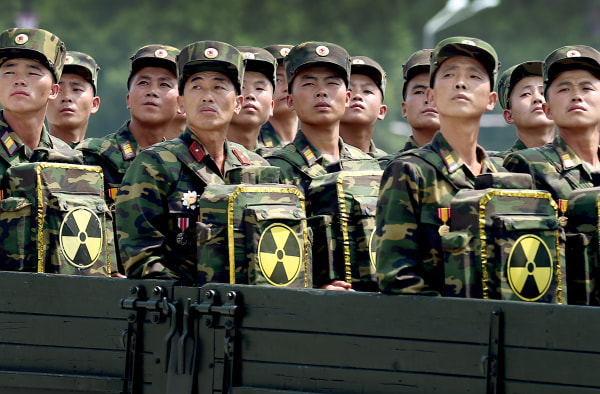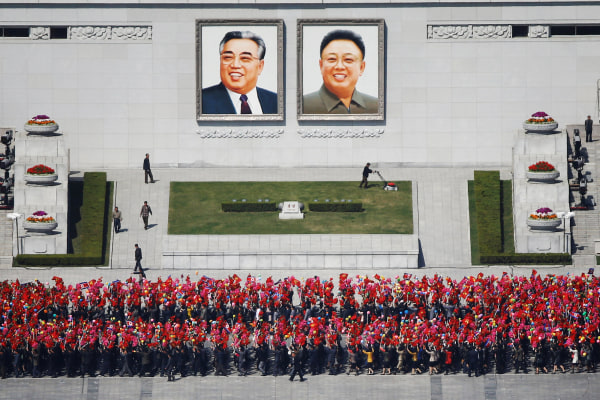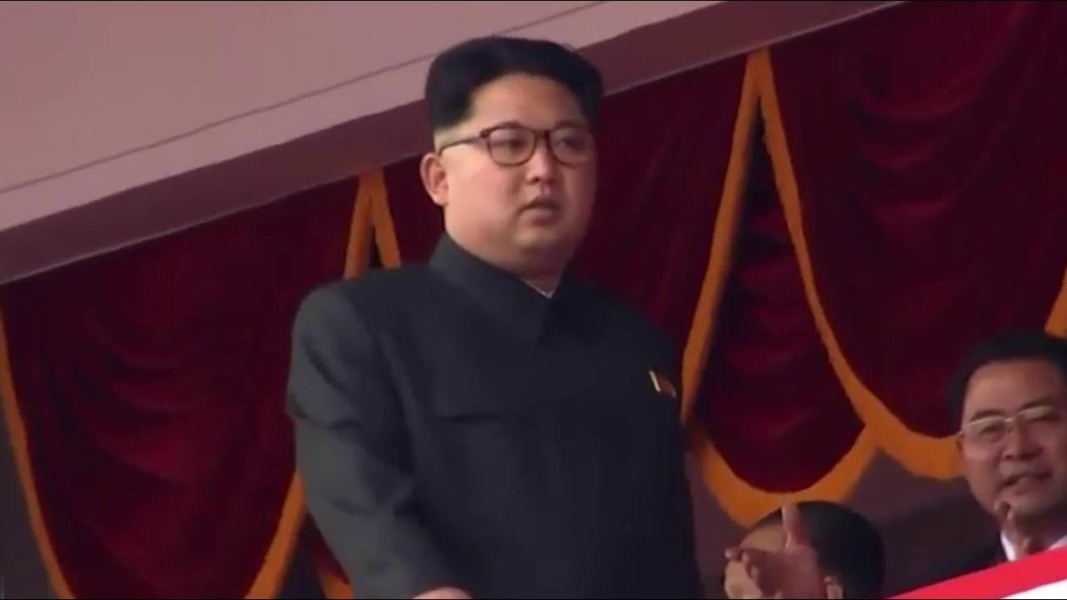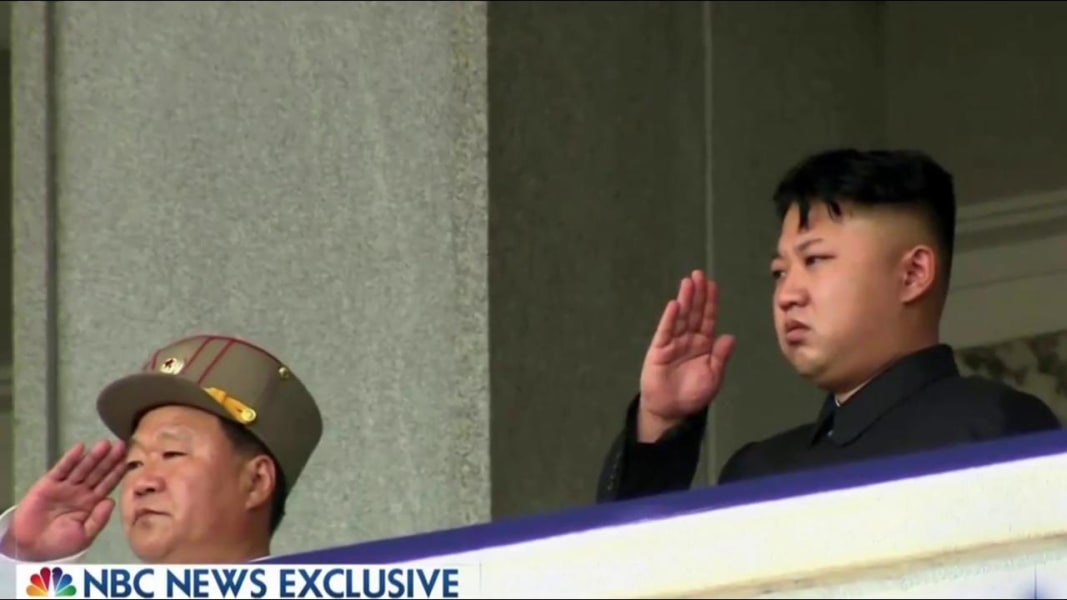The U.S. is prepared to launch a preemptive strike with conventional weapons against North Korea should officials become convinced that North Korea is about to follow through with a nuclear weapons test, multiple senior U.S. intelligence officials told NBC News.
North Korea has warned that a "big event" is near, and U.S. officials say signs point to a nuclear test that could come as early as this weekend.
The U.S. is prepared to launch a preemptive strike with conventional weapons against North Korea should officials become convinced that North Korea is about to follow through with a nuclear weapons test, multiple senior U.S. intelligence officials told NBC News.
North Korea has warned that a "big event" is near, and U.S. officials say signs point to a nuclear test that could come as early as this weekend.
The intelligence officials told NBC News that the U.S. has positioned two destroyers capable of shooting Tomahawk cruise missiles in the region, one just 300 miles from the North Korean nuclear test site.
American heavy bombers are also positioned in Guam to attack North Korea should it be necessary, and earlier this week, the Pentagon announced that the USS Carl Vinson aircraft carrier strike group was being diverted to the area.
The U.S. strike could include missiles and bombs, cyber and special operations on the ground.
The danger of such an attack by the U.S. is that it could provoke the volatile and unpredictable North Korean regime to launch its own blistering attack on its southern neighbor.
"The leadership in North Korea has shown absolutely no sign or interest in diplomacy or dialogue with any of the countries involved in this issue," Victor Cha, the Korea Chair at the Center for Strategic and International Studies told NBC News Thursday.
On Wednesday, North Korea said it would "hit the U.S. first" with a nuclear weapon should there be any signs of U.S. strikes.
On Thursday, North Korea warned of a "merciless retaliatory strike" should the U.S. take any action.
"By relentlessly bringing in a number of strategic nuclear assets to the Korean peninsula, the U.S. is gravely threatening the peace and safety and driving the situation to the brink of a nuclear war," said North Korea's statement.
North Korea is not believed to have a deliverable long-range nuclear weapon, according to U.S. experts, nor does it yet possess an intercontinental missile.
South Korea's top diplomat said today that the U.S. would consult with Seoul before taking any serious measures. "U.S. officials, mindful of such concerns here, repeatedly reaffirmed that (the U.S.) will closely discuss with South Korea its North Korea-related measures," Foreign Minister Yun Byung-se told a special parliamentary meeting. "In fact, the U.S. is working to reassure us that it will not, just in case that we might hold such concerns."
U.S. Officials Are Aware of the Risk
"Two things are coming together this weekend," said retired Adm. James Stavridis, former commander of NATO and an NBC analyst. "One is the distinct possibility of a sixth North Korean nuclear weapons detonation and the other is an American carrier strike group, a great deal of firepower headed right at the Korean Peninsula."
The U.S. is aware that simply preparing an attack, even if it will only be launched if there is an "imminent" North Korean action, increases the danger of provoking a large conflict, multiple sources told NBC News.
"It's high stakes," a senior intelligence official directly involved in the planning told NBC News. "We are trying to communicate our level of concern and the existence of many military options to dissuade the North first."
"It's a feat that we've never achieved before but there is a new sense of resolve here," the official said, referring to the White House.
The threat of a preemptive strike comes on the same day the U.S. announced the use of its MOAB — or Mother of All Bombs — in Afghanistan, attacking underground facilities, and on the heels of U.S. missile strikes on a Syrian airbase last week, a strike that took place while President Trump was meeting with Chinese President Xi Jinping at Mar-a-Lago.

Multiple government officials familiar with the situation say President Trump has talked to Chinese president Xi twice about North Korea since their Florida summit.
China has since sent its top nuclear negotiators to Pyongyang to communicate the gravity of the situation to the North, officials say. On Wednesday, President Xi called for a peaceful resolution to the escalating tensions.
Moscow has weighed in as well: "We are gravely concerned about Washington's plans regarding North Korea, considering hints about the unilateral use of a military scenario" the Putin government said in a press release issued on Tuesday.
South Korea Must Sign Off
Implementation of the preemptive U.S. plans, according to multiple U.S. officials, depends centrally on consent of the South Korean government. The sources stress that Seoul has got to be persuaded that action is worth the risk, as there is universal concern that any military move might provoke a North Korean attack, even a conventional attack across the DMZ.
Tensions have escalated on the Korean Peninsula, as this Saturday marks the anniversary of the birth of the nation's founder — Kim il-Sung, grandfather of the current leader, Kim Jong-un. At the highest levels in South Korea and the U.S., sources told NBC News, there are fears North Korea could mark the "Day of the Sun" by testing a nuclear device.
"North Korea in the past has used these major national holidays to celebrate the strengths of the regime and to reinforce the national narrative of their independence," says Cha.
According to multiple sources, the U.S. intelligence community has reported with "moderate confidence" that North Korea is preparing for its sixth underground nuclear test, though the U.S. is also in the dark regarding the specific timing.
The Trump administration, emboldened by their punishing strike on Syria, and by a successful meeting with the Chinese leader, hopes that the Chinese will use their considerable leverage to dissuade Kim Jong UN and his government from moving ahead with their nuclear program.
President Trump has said he thinks Xi "wants to help us with North Korea," He credited China during Thursday's White House news conference with Xi with taking a "big step" by turning back boats of coal that North Korea sells to China.

"I think that is what President Trump is getting trying to get the Chinese to do," said Cha. "[It] would impose real pain and force real choices on North Korea — whether the costs are worth it for them to continue to pursue this program if they no longer have any sustenance."
In addition to the coal ships, the Chinese made an important gesture at the UN Thursday: A surprising abstention on a Security Council resolution condemning a Syrian chemical weapons attack. China didn't stand with the Russians on Syria, as it has in the past.
The president also made clear that if the Chinese were unable to defuse the situation, the U.S. would go to alone. On Thursday, he tweeted: "I have great confidence that China will properly deal with North Korea. If they are unable to do so, the U.S., and its allies will!"



ConversionConversion EmoticonEmoticon